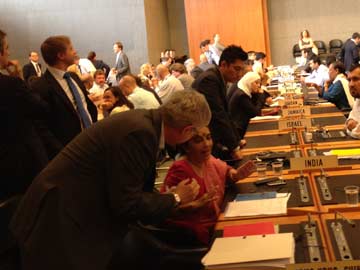
India has told its fellow members of the World Trade Organisation or WTO that it finds a clear will to engage in areas of interest to developing countries conspicuously absent. The 160 members of the WTO are meeting in Geneva.
Here are the Top 10 Developments in this story:
In its statement, India emphasised that a solution to the food subsidies issue is "important because millions of farmers and poor families depend on domestic food stocks do not have to live in constant fear. To jeopardise the food security of millions at the altar of a mere anomaly of rules is unacceptable."
India has reiterated that it links signing the Trade Facilitation Agreement or TFA, for which the WTO has gathered, with a resolution to its concerns on food security. "Let the TFA protocol be postponed till a permanent solution on public stockholding is found," said the statement.
India has emphasised that while it views timelines as important, "we cannot afford to act in haste in the WTO ignoring concerns expressed by members." And has suggested a new deadline of December 31, instead of July 31, for signing the deal.
The WTO was supposed to rubber stamp the TFA, agreed on in Bali last December, on Thursday. But the meeting was adjourned until Friday after India said it would veto the agreement until it gets what it wants on food subsidies and stockpiling.
Informal talks are proceeding to resolve the problem before the July 31 deadline. The WTO's first ever global trade agreement needs to be implemented by the middle of next year. Some estimates say it could add $1 trillion to the world economy and create 21 million jobs.
India stockpiles food for its poor, citing the need for food security. But this puts it at risk of breaking rules of the WTO, which worries that the stockpiling of subsidised food can distort trade.
The current WTO norms limit the value of food subsidies at 10 per cent of the total value of food grain production of a country. So the US gives about USD 120 billion as agriculture subsidy as compared to India's USD 12 billion.
The subsidy support is calculated at prices that are over two decades old, not at current prices. India is asking for a change in the base year (1986) for calculating food subsidies.
Several countries have issued statements saying that a failure to agree on the TFA deal will be a massive blow to the WTO, which is trying to emerge from a decade of failed negotiations on further liberalising global trade.
In her written reply to a question in parliament hours before the Geneva meeting was due to start, Commerce Minister Nirmala Sitharaman said India's concerns about subsidies had not been addressed since the Bali deal. "Till there is an assurance and visible outcomes...India would find it difficult to join the consensus on the Protocol of Amendment," she said.

